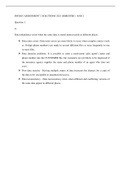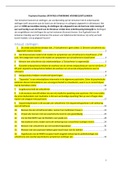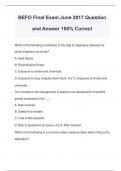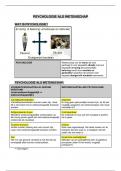Parasites can't live without their host
They vary in size, host, multi/unicellular
A specific type of female mosquito is the
place where malaria grows; when it’s
injected in the human host, it can get
picked up again by another mosquito
Both human and mosquitos are required
in the life cycle of the malaria parasite
Red blood cells are being destroyed
which causes anemia and toxins are
released which also leads to disease and
death
Schistosomiasis infection is caused by a worm; they
live in snails in the water; they can penetrate into
the human skin when you're in contact with the
water
They produce eggs while staying in the bloodstream
which you excrete, after which they can infect snails
again
They are very long-lived and can stay in your body
without treatment for a long time
It is hard to make vaccines because immunity doesn't really occur, you can get infected again
easily
Luckily there are drugs, selective toxicity is based on discrimination between host and
parasite targets
The question for vaccine development is what are the immune mechanisms stimulated by
parasites: humoral or cellular response? What we do know is that there is hardly no memory
what makes it harder
Antigenic diversity there are different forms of the same gene in a population of a
specific parasite; so, there are different epitopes what is a problem by producing a vaccine
Antigenic variation the same individual parasite can change its surface protein when
necessary; in this way, vaccines also become useless
LT3 Viruses
Viruses are intracellular parasites
,The viral genome can consist of DNA or RNA (so some don't have DNA, only RNA)
It uses the cellular systems of the host, like the protein synthesis; new viral particles are
produced and released so they can infect other cells and other organisms
Viruses consist of genome, a protein coat which consists of capsid proteins, some have a
surrounded membrane envelope (lipid, also has proteins)
Viruses really need cells to replicate
They are classified according to nature of the nucleic acid (DNA or RNA, also various shapes
like single or double stranded DNA/RNA), symmetry of the protein shell, presence or
absence of lipid membrane (envelope) and dimensions of virion and capsid
Baltimore classification is based on how the mRNA is made, because at some point they
always have mRNA (otherwise no proteins can be made)
Parvovirus has single stranded DNA; first it has to make the DNA double stranded to make
mRNA
Ebola has negative stranded RNA which can be translated to +mRNA, -mRNA is the
complement strand in this case
Corona virus has +RNA which first has to be translated to a complement -RNA strand which
is the template for mRNA
Functions of virion proteins are protection of the viral genome (form a protective shell,
packaging the genome) and delivery of the genome (binding to host cell receptors
Other functions are enabling viral gene expression and genome replication (reprogramming
of the cell cycle and translation) and additional interaction with the host (trying to avoid
immunity for example)
Virions (= virus particles) are meta-stable structures, the interaction with the host particles
frees energy which changes the conformation of the proteins so they can enter the cell or
nucleus
The influenza virus replicates in the nucleus even though it is an RNA virus
The nucleocapsid is a protective coat; it is a protein structure; it is highly basic
The proteins aren’t very big, most of the time more of the same protein form the shell
together
There is helical symmetry, it consists of one sort of capsid protein which forms a helical
structure which covers the genome
, Icosahedral symmetry is most economical way to build a closeted symmetric shell; it has 20
faces each an equilateral triangle; (this is the shape you think all viruses look like)
All the proteins have the same interaction with the neighbors, so the energy is the same
everywhere
Quasi-equivalence is not the same interaction everywhere, this creates a larger virus with
more space for the genome
Viral matrix proteins are integrated in the envelope; they play a crucial role in virus
assembly; they link the viral proteins with the envelope
Viral envelope glycoproteins make interaction with the host cell; ectodomain is for
attachment, antigenic sites and fusion so is outside of the virus; the internal domain is in the
membrane and interact with RNP via M proteins
These proteins are important for immunology; antibodies bind the ectodomain to block
entry of the cell
Other virion components are enzymes (polymerases, integrases, proteases, capping
enzymes, topoisomerases), other viral components (activators for infection, immune evasion
proteins, pore proteins) and cellular components (histones, tRNA, lipids)
The virus binds the receptor penetration of the membrane uncoating to allow
replication
The receptors are normal cell proteins; the affinity is low, but there are multiple proteins
involved which leads to a high avidity
None-enveloped viruses make holes to infiltrate their genome and other components
Fusion can be pH independent on the plasma membrane (membranes fuse together) or acid
activated fusion which is on the endosomal membrane
Add NH4Cl to determine which route is used the endosome route is inhibited because
they need an acid environment
The pH can change the conformation of proteins which is required to initiate the fusion
The host provides proteins needed for transcription
RNA polymerase II of the host is used for production of mRNA by DNA viruses
Transcription is regulated by viral proteins that act as transcription activators (in
combination with host transcription factors); often temporal regulation of expression; also
use splicing to produce several proteins
RNA viruses need their own RNA-dependent RNA polymerase (host doesn't have that); being
a + or – RNA has a big difference, because -RNA can't be translated to mRNA without RNA-
dependent RNA polymerase
+RNA doesn't need RdRP, complimentary strand severs as a template for new genome RNA
or subgenomic mRNA
The mRNA encodes a large protein for RNA polymerase and other subgenomic mRNAs which
encode structural proteins
The advantage of having subgenomic RNAs is that you can regulate the transcription
-RNA can't serve as mRNA so needs RdRP
Unimolecular RNA viruses have RNA which encodes for multiple short mRNA strands











